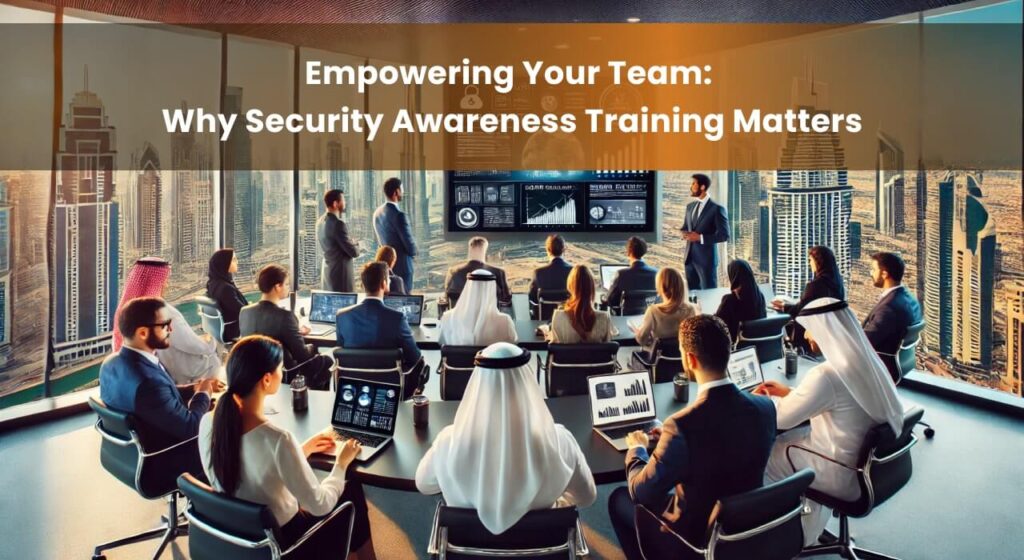
The digital landscape of the United Arab Emirates (UAE) is experiencing phenomenal growth, with small businesses playing an increasingly vital role in the nation’s economic dynamism. However, this very growth fosters a concerning trend: the escalating threat of cyberattacks. Unlike their larger counterparts, small businesses often lack the extensive resources to fortify their digital perimeters. This vulnerability makes them prime targets for sophisticated cybercriminals, whose methods have grown in complexity and stealth.
According to a recent study, a staggering 60% of small and medium-sized enterprises (SMEs) in the UAE have encountered at least one cyberattack in the past year. These attacks can cripple a business, resulting in devastating financial losses, operational disruptions, and irreparable reputational damage. The rising costs of ransomware alone, exceeding $1.4 million on average, pose an existential threat to many SMEs.
Fortunately, advancements in Artificial Intelligence (AI) offer a ray of hope. By leveraging AI-powered security solutions, small businesses can achieve a proactive stance against cyber threats. Machine learning algorithms can analyze vast amounts of data to identify and thwart attacks in real-time, empowering even resource-constrained organizations to safeguard their critical assets.
The Cybersecurity Threat Landscape for Small Businesses in the UAE

The exponential growth of the UAE’s digital economy has created a lucrative landscape for cybercriminals, with small businesses emerging as prime targets. A concerning report by the UAE Cybersecurity Council indicates that a staggering 86% of SMEs in the nation have experienced at least one cyberattack in the past year. This vulnerability stems from the limited resources available to many smaller organizations, making them less equipped to defend against sophisticated cyber threats.
These threats encompass a diverse range of malicious tactics designed to exploit security gaps and compromise valuable data. Phishing attacks, for instance, utilize deceptive emails or messages to trick employees into revealing sensitive information or clicking on malicious links that can download malware onto company systems. Malware, a broad term encompassing viruses, worms, and ransomware, wreaks havoc by disrupting operations, corrupting data, or holding it hostage for exorbitant ransoms. Ransomware attacks have become a particular concern for businesses, with the average cost of remediation exceeding $1.4 million globally, according to a study by Cybersecurity Ventures. Data breaches, often resulting from successful phishing attempts or malware infections, expose sensitive customer or financial information, leading to reputational damage, regulatory fines, and significant financial losses.
| Threat | Impact | Financial Loss |
|---|---|---|
| Phishing Attacks | Data breaches, operational disruptions, reputational damage | Lost revenue, regulatory fines, remediation costs |
| Malware | System outages, data corruption, ransomware attacks | Lost productivity, data recovery costs, potential ransom payments |
| Ransomware | Complete data encryption, operational paralysis, reputational damage | Potential ransom payments, data recovery costs, lost revenue |
| Data Breaches | Customer churn, regulatory fines, reputational damage | Lost revenue, legal fees, brand remediation costs |
The financial losses associated with cyberattacks can be devastating for small businesses. The aforementioned statistics highlight the urgency for SMEs to prioritize cybersecurity measures and invest in robust defenses. By conducting a thorough cybersecurity risk assessment and implementing appropriate safeguards, small businesses can mitigate these threats and operate with greater confidence in the digital landscape.
Why Traditional Security Methods Fall Short

While firewalls and antivirus software have historically served as foundational cybersecurity measures, their limitations become increasingly apparent in the face of today’s dynamic threat landscape. These traditional solutions operate on a pre-defined set of rules, effectively acting as a digital moat around a castle. However, cybercriminals are constantly refining their tactics, employing ever more sophisticated malware and social engineering techniques to breach these defenses.
The static nature of traditional security also presents a challenge. Antivirus software relies on signature-based detection, meaning it can only identify threats it has previously encountered. This leaves businesses vulnerable to zero-day attacks, which exploit unknown vulnerabilities. Furthermore, maintaining and updating these systems can be a resource-intensive task for small businesses with limited IT staff. Patching vulnerabilities and configuring firewalls requires ongoing vigilance, which can be a burden for smaller organizations.
In conclusion, traditional security methods, while valuable building blocks, are insufficient to safeguard businesses in today’s ever-evolving cyber threat landscape. The need for a more proactive and adaptable approach to cybersecurity is paramount, particularly for small businesses with limited resources.
How AI Can Revolutionize Your Cybersecurity Strategy

The ever-evolving threat landscape necessitates a paradigm shift in cybersecurity strategies. Artificial intelligence (AI) presents a powerful solution, empowering small businesses to combat cyber threats with unprecedented efficiency and effectiveness. AI-powered cybersecurity solutions leverage advanced machine learning algorithms to analyze vast amounts of data from network traffic, user activity, and endpoint devices. By sifting through this data deluge, AI can identify subtle patterns and anomalies that might escape human analysts, providing early warnings of potential cyberattacks.
Imagine a constantly vigilant sentinel guarding your digital perimeter. This is precisely the role AI plays in cybersecurity. Here’s how AI transforms your security strategy:
- Threat Detection and Prevention: AI can analyze network traffic in real-time, identifying suspicious patterns indicative of malware, phishing attempts, or unauthorized access attempts. This proactive approach allows for early intervention before an attack can gain traction.
- User Behavior Analytics (UBA): User behavior serves as a valuable indicator of potential threats. AI-powered UBA analyzes user activity patterns, pinpointing deviations from established norms. Unusual login attempts, data downloads, or file access patterns can flag potential insider threats or compromised accounts.
- Automated Incident Response and Remediation: Speed is paramount in cybersecurity. AI can automate the incident response process, triggering pre-defined actions upon detecting a threat. This could involve isolating infected devices, quarantining compromised data, or notifying security personnel.
- Vulnerability Scanning and Prioritization: AI can streamline vulnerability management by automating vulnerability scans across your IT infrastructure. It then prioritizes these vulnerabilities based on exploitability and potential impact, allowing you to focus resources on the most critical issues first.

By employing AI, small businesses can overcome the limitations of traditional security methods and achieve a more robust cybersecurity posture. AI empowers them to automate mundane tasks, gain real-time threat intelligence, and proactively address potential security breaches. This translates to a more efficient and cost-effective approach to cybersecurity, enabling small businesses to focus on their core operations with greater confidence.
Benefits of AI-powered Cybersecurity for Small Businesses in the UAE
For small businesses in the UAE, navigating the ever-evolving cybersecurity landscape can be a daunting task. Limited resources often force them to choose between robust in-house security teams, which can be financially prohibitive, and less comprehensive solutions that leave vulnerabilities exposed. AI-powered cybersecurity offers a compelling alternative, delivering a multitude of advantages specifically tailored to the needs of smaller organizations.
Cost-Effectiveness: Building and maintaining a dedicated cybersecurity team requires significant investment in personnel, training, and ongoing maintenance. AI solutions provide a scalable and cost-efficient alternative. They offer continuous protection without the need for additional staff, significantly reducing overall cybersecurity expenditures. This frees up valuable financial resources that small businesses can then reinvest in core operations or growth initiatives.
24/7 Vigilance: Cyber threats are not confined to business hours. Hackers operate around the clock, exploiting any window of opportunity. AI transcends human limitations, providing uninterrupted threat detection and monitoring. AI systems tirelessly analyze data streams in real-time, 24/7, identifying suspicious activity and triggering alerts even outside of regular working hours. This ensures that potential threats are identified and addressed promptly, minimizing the potential for damage and disruption.
Scalable Protection: As a small business flourishes, its IT infrastructure expands, and consequently, its cybersecurity needs evolve. Traditional security solutions often require frequent upgrades or overhauls to keep pace with this growth, leading to additional costs and disruptions. AI solutions, however, boast inherent scalability. They can seamlessly adapt to a growing network, automatically scaling up their monitoring capabilities and threat detection capacity to accommodate the expanding infrastructure. This ensures continuous protection throughout a company’s development journey, eliminating the need for disruptive and expensive system overhauls.
In conclusion, AI-powered cybersecurity offers a transformative solution for small businesses in the UAE. By delivering cost-effectiveness, uninterrupted monitoring, and scalable protection, AI empowers these businesses to compete confidently in the digital landscape without compromising their security posture.
To learn more about how AI and automation are empowering organizations to streamline security processes and enhance threat detection, explore our follow-up article: “Exploring the Role of AI and Automation in Streamlining Cybersecurity Processes“.
Choosing the Right AI-powered Cybersecurity Solution
The abundance of AI-powered cybersecurity solutions can be overwhelming for small businesses in the UAE. To ensure you select the optimal solution for your organization’s needs, consider the following key factors:
- Compatibility with Existing IT Infrastructure: A seamless integration with your current IT environment is crucial. Ensure the AI solution is compatible with your existing operating systems, hardware, and software applications to avoid disruptions or integration complexities.
- Scalability and Customization Options: As your business grows, your cybersecurity needs evolve. Choose an AI solution that can scale alongside your organization, offering the flexibility to expand its monitoring capabilities and threat detection capacity as your IT infrastructure expands. Additionally, customization options allow you to tailor the solution to address your specific security concerns and priorities.
- Ease of Use and Management: While AI-powered, the chosen solution shouldn’t require extensive technical expertise for day-to-day operations. Look for a system with a user-friendly interface that simplifies management and allows your existing IT staff to leverage its functionalities effectively.
- Vendor Reputation and Customer Support: Selecting a reputable vendor with a proven track record in AI cybersecurity is essential. Evaluate the vendor’s experience, customer support offerings, and commitment to ongoing product updates and security patches. Reliable customer support ensures you receive timely assistance if any issues arise.
- Compliance with UAE Regulations: The UAE enforces strict data privacy regulations, such as Federal Decree-Law No. 31 of 2022 on Personal Data Protection. Verify that the AI solution adheres to these regulations and offers features that can assist with data classification and anonymization, minimizing the risk of non-compliance.
By carefully considering these factors, small businesses in the UAE can make an informed decision when selecting an AI-powered cybersecurity solution that effectively safeguards their digital assets and fosters a secure business environment.
Security Awareness Training Remains Crucial

While AI-powered solutions provide a robust layer of defense, ongoing cybersecurity awareness training for employees remains an essential element of any strong security posture. Phishing attacks and social engineering tactics are constantly evolving, and even the most sophisticated AI systems can be susceptible to these human-targeted threats. A well-trained workforce equipped with the knowledge to identify suspicious emails, recognize social engineering attempts, and report potential breaches remains a critical line of defense for any small business in the UAE.
In today’s ever-evolving digital landscape, robust cybersecurity is no longer a luxury, but a necessity for small businesses in the UAE. Limited resources can often hinder the implementation of comprehensive security measures. However, AI-powered cybersecurity solutions offer a compelling alternative, addressing these limitations and delivering a multitude of benefits. From cost-effectiveness and continuous monitoring to scalability and regulatory compliance, AI empowers small businesses to compete confidently with enhanced protection. By embracing AI-powered solutions and fostering a culture of cybersecurity awareness within their workforce, small businesses in the UAE can build a proactive and comprehensive security strategy, safeguarding their digital assets and fostering a secure environment for growth.
Comments